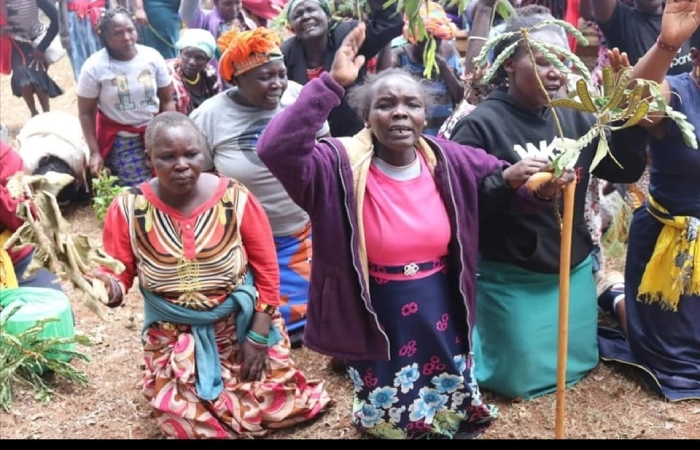By Washington Barasa Kiptoo, Human Rights Lawyer based in Nairobi.
The lower side of Mochongoi in Baringo County is at its hour of maximum need.
Increasingly, the semi-arid and rocky valleys of Arabal, Sinoni, Kasiela and Lomaiywe have seen the worst forms of armed banditry during the first quarter of 2022.
As I put my thoughts on paper and paint a picture of the reality of the situation, women and children are making arduous mass trek out of remote villages with nylon sacks bearing hurriedly collected belongings weighing heavy on their backs. They are seen driving a few livestock remnants here and there. The IDPs are heading either to Marigat or Kabel trading centres before nightfall, where they will thence feel a sense of safety. The bandits have never attacked the sub-county administrative headquarters due to availability of key government installations.
A viral video of an innocent five-year-old young girl circulating on social media asking the mother to walk fast and catch up with her and her other younger sibling before they vanish into a winding dirt road is circulating on social media. The mother is seen gazing at several off-road motor vehicles carrying security bosses and government officials who are appearing to respond to the conflict. The mother who has bizarrely lived experience of the conflict seems to be asking herself the million-dollar question: “if these state officials cannot pacify the armed bandits, who will? Or perhaps, she is questioning the razzle-dazzle in the convoy that will not bother the bandits.
Illicit firearms exacerbate the menace of cattle rustling.
Historically, cattle rustling was a cultural phenomenon practised by all pastoralist communities in the North Western parts of Kenya and specifically common to Kalenjins and their cattle-rearing neighbours such as Maasais and Turkana.
Throughout the 1980s, cattle rustling stopped appealing as agribusiness took root in most of these communities.
Understandably, two communities, Turkana and Pokot, dictated by unfavourable climatic conditions for crop rearing, remained exclusively pastoralist. Their cultures and livelihood surrounded keeping large herds of indigenous cattle. The two communities were the first to acquire illegal firearms from troubled neighbours in the East and Horn of Africa through international borders.
The firearms were initially intended for self-protection but later used to raid each other’s cattle. By the 1990s, for instance, the Pokots managed to drive away Turkanas from areas such as Nadume, Akoret, Lomelo and Kapedo. Turkanas lost large herds of cattle and settled as internally displaced persons at the present day Kambi Turkana at the fringes of Marigat town. Some fled away to work in plantation farms in Mogotio and Naivasha.
The Moi regime characteristically blew hot and cold in addressing cattle rustling. In one instance, a brutal force was applied to disarm the Pokot, and in the run-up to the general elections, Moi told the Pokot otherwise.
The atomistic state approach to disarmament and unresolved injuries suffered by the Pokots during operations made them radicalised and anti-government. The Truth Justice and Reconciliation Commission (TJRC) Report documented much of this. The Pokot chose to be pariahs and spent sufficient time to train almost every man to handle and skilfully use a gun. Pokot warriors are now de facto community decision-makers and have a significant say and sway on who is elected, for instance, to parliament.
Is State Security Losing legitimate Monopoly over the Means of Violence?
Legally speaking, only the state has a monopoly over the means of violence. Therefore, it follows that when armed groups that potentially pose a threat to law and order spring up, the state security forces are lawfully required to disarm, demobilise, and reintegrate the outfits into the society, albeit within acceptable human rights principles. This forms the cardinal rule in the calling and training of our security officers. The case of cattle rustling in Baringo and the large Kerio Valley is unique because the officers have seemingly abdicated their fundamental responsibility. In Mochongoi, for instance, marauding armed bandits crisscross the area and yet five Anti Stock Theft Units Camps have been set up at Mukutani, Arabal, Rukus, Kasiela and Lomoiywe. At least nine people have been killed, six injured, homes torched, two abducted by the bandits, over 1500 livestock and over 1000 households displaced and dispossessed since January, 2022. The armed bandits have occupied the abandoned areas and occasionally grazed their livestock, of which some initially belonged to the people displaced.
Left to their own Devices.
Despite featuring daily as one of the essential news items, the conflict in Baringo has never attracted the much-needed attention of civil society groups, humanitarian agencies, the donor community, or faith-based institutions.
Human rights defenders ought to have at least carried out investigations to document the situation of the vulnerable groups, including women, older persons, people living with disabilities and children as groups who bear the greatest brunt of the conflict. There is an urgent need to call for accountability from the State.
It is alleged by the victims that collected spent cartridges belong to government stores. This begs the question of where the source is and who on the stateside has a hand in the conflict.
Pokot Warriors Branded Outlawed Militia.
By own admission, the Cabinet Secretary for Interior and Coordination observed that Pokot warriors would be categorised as an outlawed group deserving to be wiped out by all means.
The Minister indicated that he would be seeking the National Security Council’s authorisation to allow gazettement of the group as such. Whether the government shall take this step is a wait and see scenario. Mr Matiangi made this declaration after a security meeting in Nakuru last month, February 2022.
The state has dragged its feet enough yet blood is being spilt. The state has effectively lost the legitimate monopoly of violence to armed bandits. The nature and manner of atrocities meted on innocent civilians and the occupation of vacated villages suggest the illegal annexation of private lands and properties.
With the lacklustre performance of the deployed security officers in Baringo and Kerio Valley, what options do the locals have to redress ongoing violations? Methinks that roping the involvement of international assistance is vital. Soon a complaint will be lodged with the Chair of the African Union, the UN Special Rapporteur of the Indigenous Rights or even the UN Security Council.



